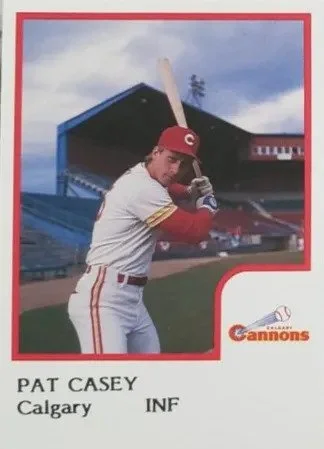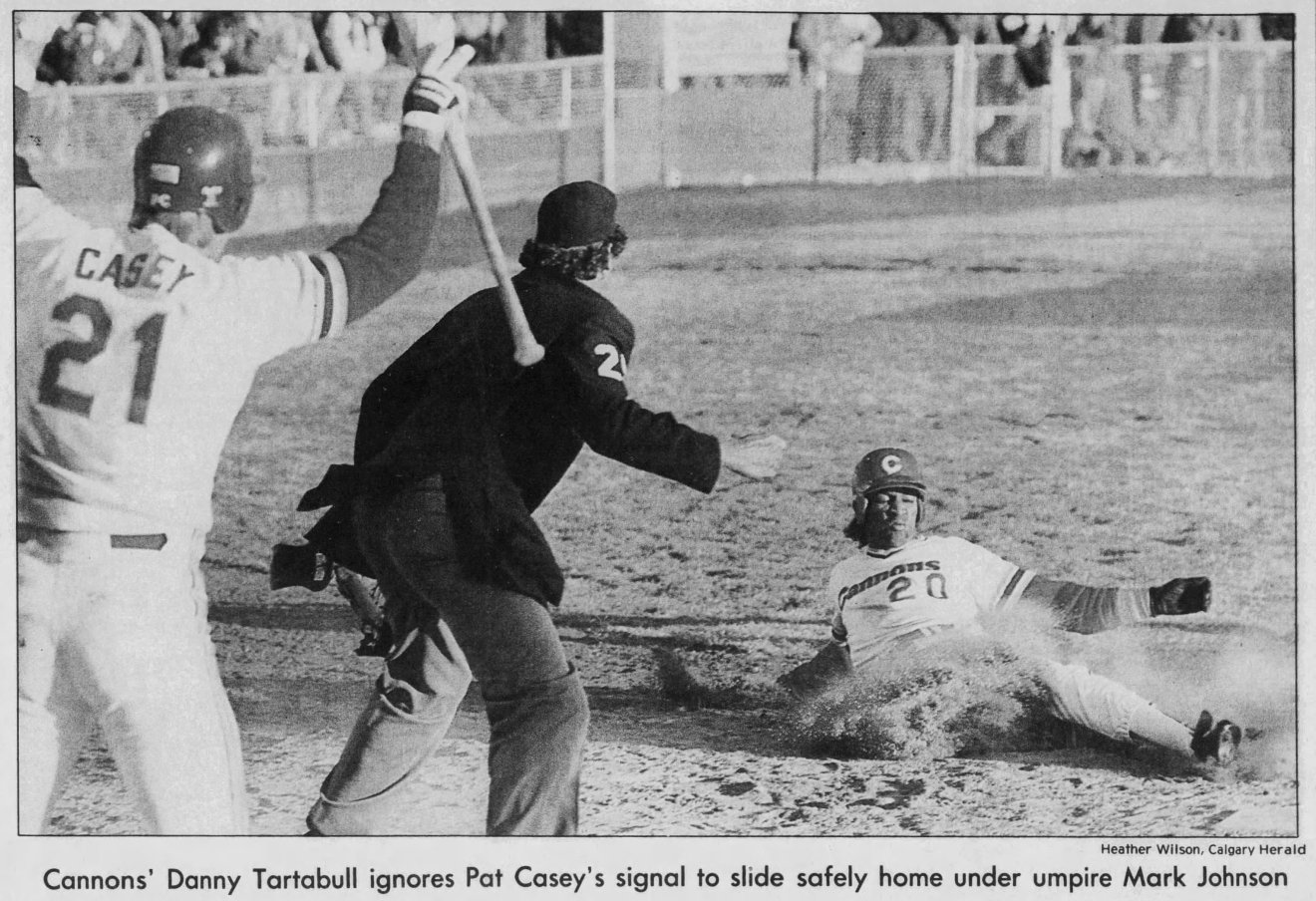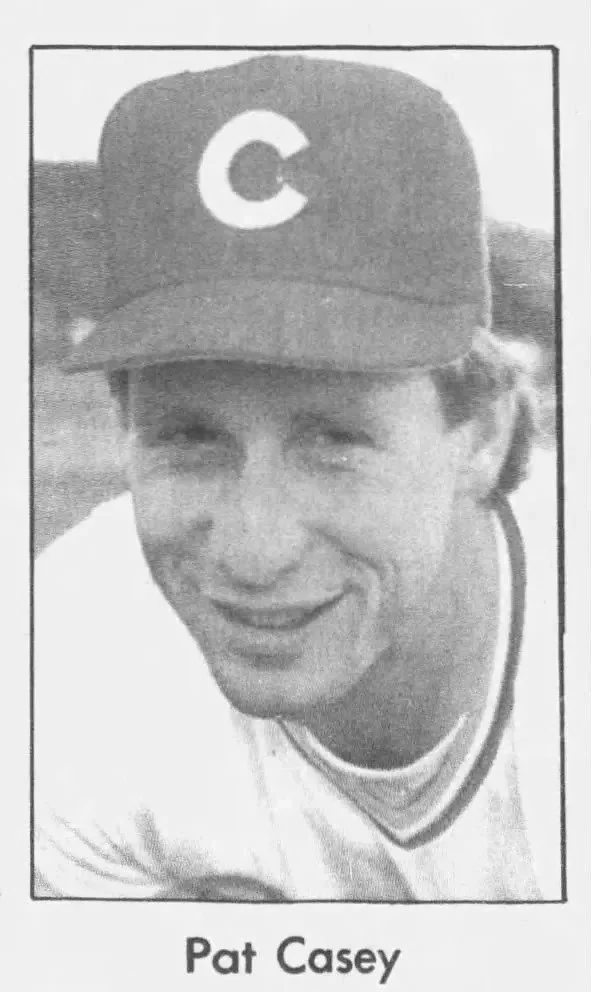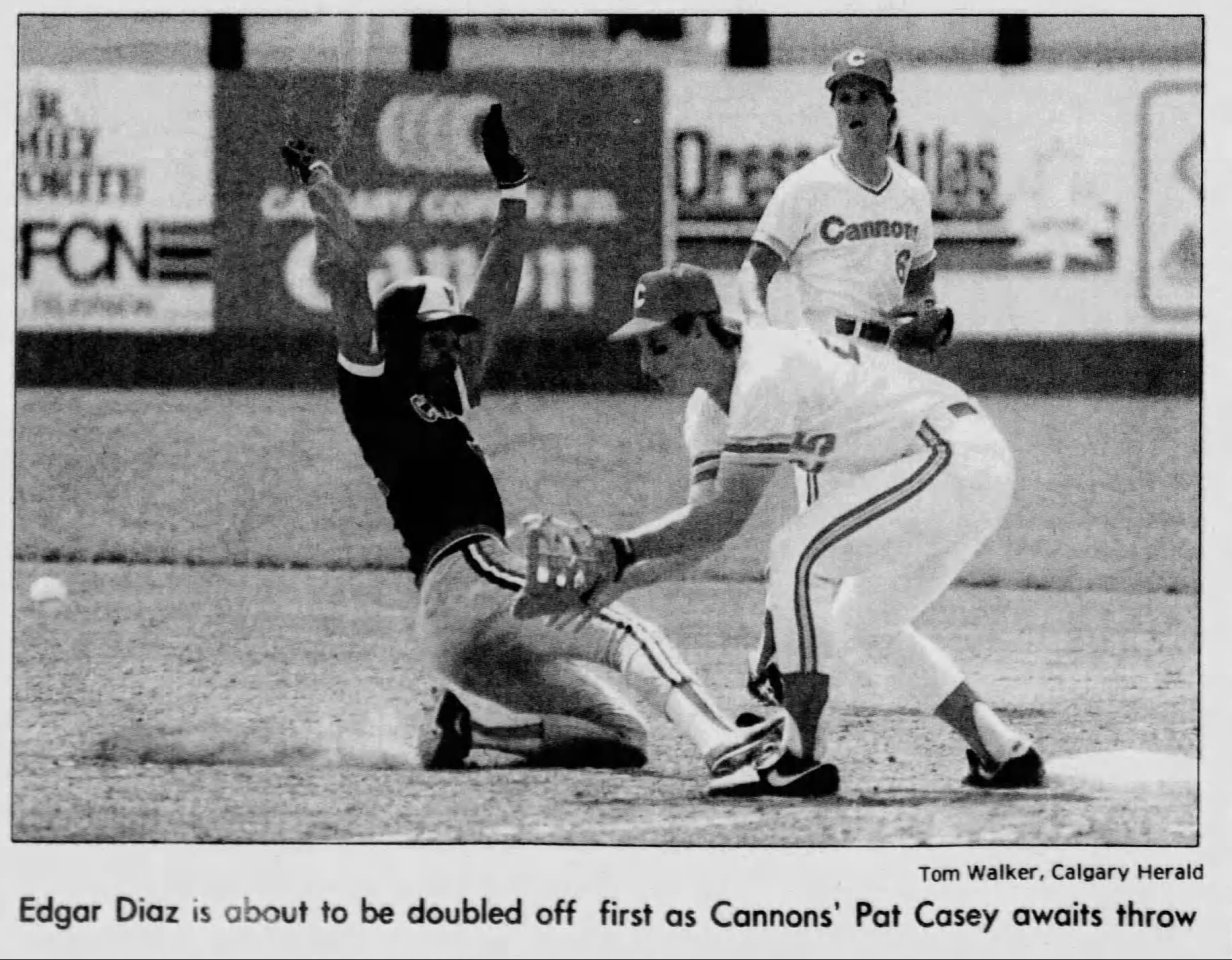Wilson: College Baseball Hall of Famer Casey enjoyed stop in Calgary
Former Calgary Cannons infielder Pat Casey was a right-handed hitter who posed as a lefty for this baseball card.
*This article was originally published on Alberta Dugout Stories on February 15. You can read it here.
February 19, 2024
By Ian Wilson
Alberta Dugout Stories
“You spend a good piece of your life gripping a baseball and in the end it turns out that it was the other way around all the time.” – Jim Bouton
Pat Casey may have thought he was done with the game of baseball, but the sport had different plans for him.
On a number of occasions, when baseball looked like it offered only dead ends, the Oregon product discovered there was more for him.
The result was a fulfilling career and the realization of a dream he never had.
“I never dreamed I’d be a baseball coach, never had a desire to be a baseball coach, and fortunately for me some of the bad decisions I thought I made turned out to be pretty good,” said Casey.
“It’s just a blessing that I had the opportunity to coach.”
Casey’s rather unlikely baseball journey began in his home state of Oregon, where he grew up playing and enjoying a number of different sports. Through his high school days in Newberg and his time at the University of Portland, the outfielder was noticed by the San Diego Padres, who selected him in the 10th round of the 1980 Major League Baseball (MLB) Draft.
The righty batter rose through the minor-league ranks of the Padres and at the Double-A level he started playing first base, a position that was filled in San Diego by All-Star Gold Glover Steve Garvey.
A move to the Seattle Mariners system in 1985 didn’t seem to offer Casey much more of an opportunity to crack a big-league roster. The M’s had 1984 American League (AL) Rookie of the Year Alvin Davis handling first base duties.
OFF TO ALBERTA
Nonetheless, the organizational shift was invigorating for Casey.
“It was great for me. I was excited about going to triple-A, excited about being in the Pacific Northwest because I grew up in Oregon. It was a fun time for me,” Casey told Alberta Dugout Stories: The Podcast.
The move meant a promotion to triple-A for the Calgary Cannons first season in the Pacific Coast League (PCL).
“I have fond memories about that whole experience. Loved Calgary, loved the people in that city,” said Casey, who played 225 games for the Cannons over two seasons in the mid-1980s.
Casey was impressed by team owner Russ Park and a talented roster that included Danny Tartabull, Mickey Brantley, Harold Reynolds, Dave Valle, Darnell Coles and Edgar Martinez.
He also experienced an unforgettable home opening week at Foothills Stadium.
“As I recall, there was more than a foot of snow on the ground and it was colder than heck, and I think we missed the first couple days and then they just pushed the snow up against the fence and around the foul lines there and we played. With the wind chill factor it was extremely cold but the fans went crazy, loved it, they were excited,” said Casey.
“You didn’t have a lot of time to think about how cold it was because you were trying to survive.”
CLOBBERING BASEBALLS WITH THE CANNONS
Survival wasn’t a problem for Casey, who produced 132 runs, 62 doubles, 31 homers, 120 runs batted in (RBI) during two campaigns with the Cannons. He boosted his batting average from .265 in 1985 to .307 in 1986 while watching his on-base percentage rise from .375 to .418 over the same period.
“I played with such great players … I learned from other players, good and bad. I watched guys who had good habits, I watched guys who had bad habits,” said Casey.
“I appreciated how much that front office and the people with the Calgary Cannons cared about baseball and what we were doing. We were treated really well there. There was just a lot of good things there. Every year that I played there was something that helped me in a positive way.”
Casey watches Tartabull score a run in this Calgary Herald photo from April of 1985. Photo: Calgary Herald
One of those positives came on July 7, 1985 when Pat and his wife, Susan, welcomed their first child, Jonathan, into the world. Susan drove from Oregon to Calgary so the family could be together for the birth.
“I figured there were just as qualified doctors up here. It would have been easier to stay home, but it worked out well,” Susan told the Calgary Herald newspaper that summer.
Jonathan’s arrival also provided Pat with valuable perspective on his baseball career.
“I have no idea when my time is over … I’ve got the same chance as everybody. I’m willing to put the sacrifice in,” Pat told reporter Jackie MacDonald in the Aug. 11, 1985 edition of the Herald.
“If I spend 20 years in the big leagues, great. If I spend 10 years in the minor leagues, I’ll know I gave it my best shot. It’s not going to be a great trauma for me. I don’t rate life’s success on whether I make the big leagues or not. It’s more important to get life squared away, being a good person and knowing what I want out of life. I’m confident if I’m playing baseball, selling insurance or digging ditches, I’ll have success.”
Photo: Calgary Herald
The Caseys returned to Oregon in 1987, where Pat suited up for the Portland Beavers, the top affiliate of the Minnesota Twins. He remained in the PCL for another 48 contests – bringing his total number of pro games to 811 – before determining that it was time for a career change.
The Twins and Mariners continued to call and offer more triple-A opportunities, but Casey declined.
“I thought I had enough,” said Casey.
THE COLLEGE RANKS
Another call came from the athletic director at Oregon’s George Fox College, who asked the newly retired ball player if he’d be interested in coaching baseball.
“I said, ‘Absolutely not. I’ve played eight years of minor-league baseball, I think I want to do something different and get a real estate license.’ Shoot, four or five days later I took the job for some crazy reason,” remembered Casey.
Yet another recruitment call came in from an official with the Baltimore Orioles, who wanted to send Casey to Rochester, New York to play for their top farm team.
“I said I would if they gave me a spot on the 40-man roster the next year and they said they couldn’t do that and that’s how my coaching career started,” said Casey, who made just $3,000 per year at George Fox College and did odd jobs like cleaning pizza parlours and helping remodel houses to make ends meet.
—————————————————————————————————————————————————————————————
Listen to Alberta Dugout Stories podcast episode about the Calgary Cannons here.
—————————————————————————————————————————————————————————————
After the Caseys had their third child, it looked like it was time for Pat to find a job that offered more financial security than coaching baseball. He steered the George Fox Bruins to a 31-13 record in 1994, and then pondered a profession outside of baseball.
Once more, a phone call interfered with that plan, however. A baseball pal wondered why Casey hadn’t applied for the head coach job at Oregon State University (OSU).
“He said, ‘I think you should, I think you’d be a great candidate for that job. You guys have played them before, they know who you are.’ So, I go down to Oregon State, hand my resume in and the gal says, ‘I’m not even sure the job is still open.’ So I thought, okay, this is perfect, I don’t even need to worry about it anymore,” recalled Casey.
“That was sometime in early July and then I was hired August 4th to be the head baseball coach at Oregon State University and that’s not a dream come true because I never dreamed it, but it certainly was a boost to me as to what I wanted to do.”
Added Casey: “I knew then, okay now I’m going to be a baseball coach. I can make a living being a baseball coach. Now I can set my feet somewhere and know this is what I’m going to do. I was given an unbelievable opportunity and it could’ve been anybody. I didn’t have any better credentials than the final four and I was just the fortunate one who got the job.”
The results of that opportunity were extraordinary. Casey served as the head coach of OSU from 1995 until 2018. With the Beavers, he put together a record of 900-458-6 and won three college World Series titles. Casey was named the Baseball America Coach of the Year in 2006, as well as Baseball America’s Coach of the Decade for 2000-2009.
“I don’t think I had very good discipline in my habits as a baseball player. I don’t think I had very good vision. I don’t think I understood how much mental work goes into it,” notes Casey of his playing career versus his time as a coach.
“You tie that into what you do physically, as well, but if you’re not mentally prepared to do something you won’t physically do what you need to do very well. I think some of the things that kept me from becoming a better player or a more productive player are some of the things that I encourage guys to look at … it’s amazing what happens when you ignite the senses of motivation with someone, what they can do as opposed to what they think they can do.”
Casey handles first base duties for the Cannons in this Calgary Herald picture from May of 1986.Photo: Calgary Herald
Despite never suiting up in a game at the MLB level, Casey has a deep appreciation for baseball and everything it’s provided in his life.
“I think it’s the greatest game that I look at as a major sport, because you can’t run the clock out, you can’t take a knee, you can’t take a timeout and give the ball to our best shooter. We’re not going to throw a pass to our best receiver. It is a game that takes not only perseverance but it takes intelligence, it takes thought, it takes time, it takes into account everything. And the reason it’s a pastime, is because you can actually take someone to a game, you sit down and talk to them,” he notes.
“You go to a football or basketball game, you’re standing on your feet the entire time, people are screaming, there’s no way to actually have a relationship or talk to somebody sitting next to you. I think it brings the fans to the players and the players to the fans greater than any other sport there was. And I think that’s really important … the great game of baseball, there’s a reason it’s the national pastime and always will be.”
Casey was inducted into the College Baseball Hall of Fame on Feb. 15.




